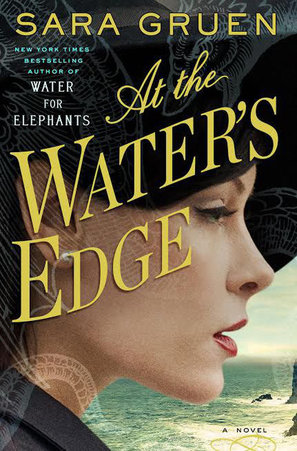 Written by Lauryn Smith Given that Sara Gruen authored “Water for Elephants” (one of my favorite books, in case you missed it!), there was no question that a review of her latest novel “At the Water’s Edge” would appear on BNR sooner or later. After a three-month hiatus, the time has come. Though not as addictive as “Water for Elephants,” “At the Water’s Edge” is a pleasant read. It is not much of a page-turner, and it includes a host of spoiled, rather dull characters, but overall, it is a smooth, interesting, well-written narrative with occasional complexity. Like some of Gruen’s previous novels, “At the Water’s Edge” is a period piece, this time set in the Scottish Highlands during the 1940s, right in the midst of World War II. The story follows the life of a rambunctious, privileged young Philadelphian woman named Madeline (Maddie) Hyde. After getting out of hand at one too many social gatherings, Maddie and her husband, Ellis, are financially cut off from Ellis’s family. Given their predicament, Maddie loyally accompanies her husband, along with their close friend Hank, on a trip to Scotland to complete a mission the men believe will ultimately restore the couple’s determinedly reckless lifestyle. Their mission, a doozy, is to prove the existence of the Loch Ness monster.
You may be wondering—how is finding Nessie even relevant? Years previous, Ellis’s father was publicly discovered to have fabricated evidence of the creature, and the resulting embarrassment never fully dissipated. Instead, hints of shame lurk in the shadows of conversation regarding the family. For Ellis's father, it is a haunting element of the past, an unsightly stain on the family name. Thus the group's action plan. Put simply:
Sounds straightforward enough. What could go wrong? As it turns out, a lot. Given the subject she chose to write on, Gruen succeeds in producing a charming novel. She has a gift with words, and her writing is effortless, which alone makes “At the Water’s Edge” worth reading. However, the book could use a spark, something to pull readers deeper into the story and facilitate their relationship with it. For instance, the novel may have benefitted from a stronger focus on the myth of Nessie, especially since it is technically the novel’s umbrella. Who doesn't love the feeling of discovering new pop history factoid? The world of Loch Ness seems ripe for the picking, but “At the Water’s Edge” leaves readers wanting. What Gruen does instead is throw in occasional paragraphs full of impersonal war statistics, juxtaposing them with text that focuses on personal relationships, both crumbling and budding. All this leaves the book feeling a bit generic. Written from Maddie’s perspective, “At the Water’s Edge” often seems flowery, as if the idea of hard work is quaint and strife an occasional peculiarity. However, this trait may be unavoidable due to the lead cast, which is comprised solely of white, generally wealthy individuals who are fortunate enough to be isolated from the effects of war, until they ignorantly enter a foreign country being devastated by it, that is. That said, Gruen makes an effort to turn this tawdry facet on its head. Through Maddie’s discovering of self, nature and the mysteries of life, Gruen attempts to transition the storyline so that it feels less like a typical woman-of-an-era piece and more like an argument regarding the lesser recognized aspects of war. Let me elaborate with an example. Readers learn that Maddie, a typical high society socialite, cannot necessarily be faulted for her naivety. She has not been affected by war, largely due to the fact that her husband is exempted from participating for “medical” reasons. In Scotland, Maddie stays back and connects with the workers at the isolated inn at which they reside while her male travel companions scan the loch for Nessie day after day. She learns firsthand of the exhaustion and devastation experienced by those continually on the brink of conflict. She grows familiar with never-ending work schedules, the fear inherent to bomb threats, the terrifying possibility of losing a loved one in battle, even the necessity of makeshift beautification techniques due to limited resources. I cannot say that my understanding of any particular issues were enhanced by reading “At the Water’s Edge,” which I hate to say of a book written by such a fantastic writer. Also, given the enticing premise of the book, I was disappointed to discover that it is simply another anecdote of a rich, young, beautiful, privileged woman discovering life’s greater significances. Compared to some other novels, the content of this one seems thin. Really, the best word to describe “At the Water’s Edge” is “pleasant.” Nothing more, nothing less. If you are in the mood for a simple tale of self-discovery in times of war, then this book is for you. Title: At the Water’s Edge Author: Sara Gruen Publisher: Spiegel & Grau Publication date: March 31, 2015 Page count: 368 List price: $28 ISBN: 978-0385523233 Nominations: 2015 Goodreads Choice Award Nominee for Historical Fiction
0 Comments
Your comment will be posted after it is approved.
Leave a Reply. |

Enjoying my book reviews? If you’ve found them helpful or simply love diving into a good book, consider supporting my caffeine-fueled reading sessions! Your contribution helps keep the reviews coming and ensures I stay wide awake for those late-night reading marathons. Cheers to a shared love for literature! ☕️
Categories
All
|
